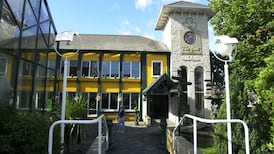Drugmaker Merck on Friday said it plans to advance an antiviral treatment for Covid-19 into large studies in the coming weeks, and it forecast a more limited hit to full-year sales and profit from coronavirus lockdowns than it previously expected.
The US company said two large trials of the oral antiviral being developed with Ridgeback Biotherapeutics would begin in September. Merck said it can manufacture "many millions of doses" of the drug before year end.
Gilead Sciences’s intravenous antiviral remdesivir is currently being widely used as a treatment for hospitalized Covid-19 patients.
Merck also expects its two experimental coronavirus vaccines to start human trials later this year, lagging some rivals who have begun late-stage studies.
Berlin’s S&M workers win stinging court victory over city officials
Many with Covid-19 symptoms not self-isolating, says NPHET, as 38 cases confirmed
Coronavirus: Johnson delays further easing of restrictions in England
Coronavirus Q&A: What is behind the spike in cases in Ireland? Should we be concerned?
The vaccine it picked up through its acquisition of Themis Bioscience should start clinical studies in the current quarter, while another being developed with nonprofit research organisation IAVI should begin trials by year end.
Merck said it now expects a 2020 revenue decline of $1.95 billion due to the precipitous drop in medical visits early in the pandemic, from its prior estimate of $2.1 billion. The company said it expects a return to normal levels in the fourth quarter.
The company noted that it still had strong second-quarter sales from blockbuster cancer drug Keytruda. Keytruda sale rose nearly 29 per cent to $3.39 billion, ahead of Wall Street expectations.
Total sales fell 7.6 per cent to $10.87 billion due to a $1.6 billion pandemic-related hit in the quarter. That still exceeded analysts’ estimates of $10.39 billion. – Reuters














